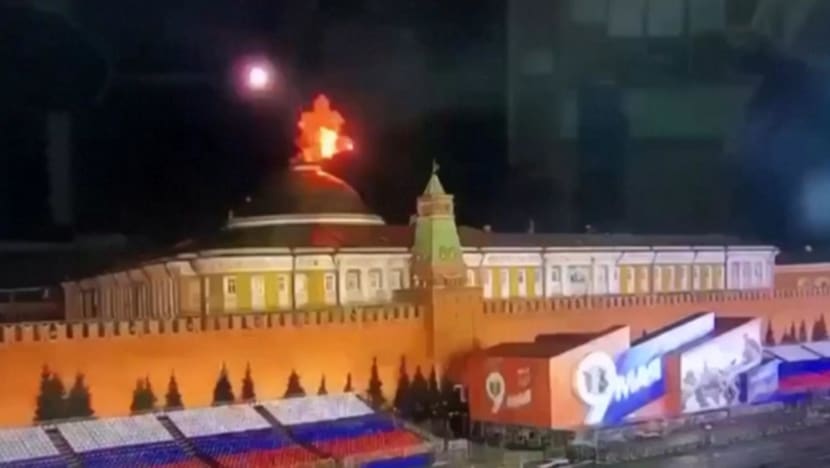Commentary: Highly unlikely that Ukraine was behind alleged drone strike on the Kremlin
A Ukrainian “terrorist attack” aimed at the Kremlin would justify Russia's invasion of Ukraine and boost public opinion of the unpopular war, says Pusan National University’s Robert Kelly.

Screengrab of a video showing the moment a drone exploded above the Moscow Kremlin in an alleged Ukraine drone attack against Russian president Putin.
BUSAN: This week, two drones ostensibly attacked the Kremlin, the seat of the Russian presidency in Moscow. Russian President Vladimir Putin was reportedly not in the Kremlin at the time and never in any danger. The drones were shot down.
The incident has provoked much speculation. Russia claims it was a Ukrainian effort to kill the Russian president. Ukraine has denied this.
Western sources have provided little further evidence. US Secretary of State Antony Blinken noted the Kremlin’s credibility problem. Moscow routinely lies, so its own claim of Ukrainian culpability is highly dubious.
A FALSE FLAG ATTACK?
Instead, it is plausible that this is a faked Russian attack. Most obviously, it would provide some justification for Russia’s war in Ukraine. That war has gone poorly. Russia can prevent a strategic defeat by continuing to fight, but victory is no longer in reach. Ukraine will survive as a sovereign, Western-leaning state, even if it loses some territory.
It is not clear, however, that Putin grasps this. He keeps fighting an unpopular, unwinnable war.
So a “terrorist attack” aimed at the Kremlin serves to boost Russian public opinion of the Ukraine invasion. Indeed, Russia’s former president and prime minister Dmitri Medvedev said that the attack left Moscow with no other option “than the physical elimination of Zelenskyy and his clique”. In other words, the war must continue.
Putin has been suspected of false flag attacks before. In 1999, a series of ostensibly Chechen terrorist bombings in Russia rallied Russian public opinion behind Putin, who had just become prime minister.
These attacks led to another military operation in Chechnya, which in turn bolstered Putin’s contentious ascension to the presidency in 2000. For decades, questions have lingered over the bombings, with widespread belief that Russian security services were responsible, working to fortify the position of their new leader.
UKRAINE DOESN’T STAND TO BENEFIT FROM DRONE STRIKE
On the Ukrainian side, there are reasons to believe that this was not an assassination attempt by Kyiv. First, assassinations are frowned upon in the West. In fact, they are illegal in the United States.
It is not in Ukraine’s interest to engage in behaviour that could jeopardise Western support. The North Atlantic Treaty Organization (NATO) has substantially helped the Ukrainian resistance and is central to the upcoming Ukrainian summer offensive.
Were this assassination successful, it is unclear how the West would have responded. The Ukrainians have fought the war cautiously since the start. It is unlikely they would suddenly take such a large risk.
Second, the small size and timidity of the attack is uncharacteristic of the Ukrainians. If Ukraine were to attempt a high-profile assassination like this, it almost certainly would have been better planned and executed. Putin would have been on the grounds and at least somewhat vulnerable. Far more and larger drones would have been used.
Finally, as Ukrainian presidential adviser Mykhailo Podolyak said, Ukrainian operations out-of-theatre are almost always designed to support the war effort. Ukrainian special forces have been rumoured to attack rail and road connections in Russia near the Ukrainian border.
Such operations are far more credibly attributed to Ukraine. They are the sorts of dramatic but militarily useful operations Ukraine has conducted for a while. They help Ukraine win the war by crippling Russia’s ability to fight.
A wildly ambitious and poorly executed drone strike on the Kremlin leadership does not do that. There is no value to Ukraine in inciting the Russians, per Medvedev’s remark, into even more savagery on the battlefield.
ANOTHER EXCUSE TO TARGET UKRAINE INDISCRIMINATELY
Since the start of the war, Russia has struck Ukrainian civilian targets in an air campaign designed to bludgeon the Ukrainians into surrender. This campaign has struck schools, hospitals, apartment buildings and other non-combatant targets.
Thousands of Ukrainians have died for little military value. The campaign has sparked global outrage and kept Western opinion united behind Ukraine. After a year of these strikes, no real strategic goals have been achieved by them. It is just a terror campaign now.
As Medvedev said, the drone strike on the Kremlin gives Russia licence to keep pounding away, perhaps now directly targeting the Ukrainian leadership. It also supports any escalatory steps Russia might be considering, such as invading Ukraine from its northern neighbour, Belarus.
In the end, this is probably another Russian gimmicky distraction, like its persistent yet hollow threats to use nuclear weapons. The strike may attract debate and attention, but it does not achieve what Russia really needs - a conventional breakthrough in the war.
Russia needs forward territorial progress to drive the war toward termination on Russian terms. The alternative is a long, grinding war of attrition that drains Russia against a small adversary while major powers like NATO and China pull away. This is where Russia is now - bogged down in a quagmire akin to the Soviet invasion of Afghanistan in the 1980s.
Russia needs to win, quickly, and go home to reconstitute both its military and economy. Trying to change the subject to Ukrainian tactics does not help. Russia is still stuck.
Dr Robert E Kelly (@Robert_E_Kelly; RoberEdwinKelly.com) is a professor in the Department of Political Science at Pusan National University.

















